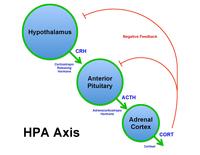
Photo from wikipedia
ABSTRACT The eyewitness and fundamental memory research fields have investigated the effects of acute stress at encoding on memory performance for decades yet results often demonstrate contrasting conclusions. In this… Click to show full abstract
ABSTRACT The eyewitness and fundamental memory research fields have investigated the effects of acute stress at encoding on memory performance for decades yet results often demonstrate contrasting conclusions. In this review, we first summarise findings on the effects of acute encoding stress on memory performance and discuss how these research fields often come to these diverging findings regarding the effects of encoding stress on memory performance. Next, we critically evaluate methodological choices that underpin these discrepancies, emphasising the strengths and limitations of different stress-memory experiments. Specifically, we elaborate on choice of stressors and stimuli, stress manipulation checks, stressor timing, and the interval between encoding and retrieval and discuss how methodological shortcomings in both the eyewitness and fundamental memory fields have limited our understanding of how encoding stress may affect eyewitness memory performance. Finally, we propose several recommendations for researchers interested in this topic, such as confirming stress inductions with physiological measures, implementing sufficient retrieval intervals to isolate the memory phase of interest and using ecologically valid memory paradigms. We conclude that the best progress can be made if researchers are responsive to the methodologies and findings reported in other research fields and encourage collaborations between the different disciplines.
Journal Title: Memory
Year Published: 2021
Link to full text (if available)
Share on Social Media: Sign Up to like & get
recommendations!